人教版初一上册英语第九单元unit 9语法篇教学文稿
人教版英语七年级上册Unit9SectionA(GrammarFocus~3c)优秀教学案例

一、案例背景
人教版英语七年级上册Unit9 Section A (Grammar Focus~3c)主要围绕一般过去时展开,让学生掌握一般过去时的构成和用法。本节课的主要内容包括一般过去时的肯定句、否定句和疑问句的构成和变化,以及过去时的标志词。通过本节课的学习,学生能够正确运用一般过去时描述过去发生的事情。
1.教师通过展示PPT,介绍一般过去时的构成和用法。
2.用具体例子解释一般过去时的肯定句、否定句和疑问句的变化规则。
3.讲解过去时的标志词,如“yesterday”、“last week”等,并给出实例进行分析。
(三)学生小组讨论
1.教师将学生分成小组,每组提供一份有关过去事情的描述,要求学生用一般过去时进行交流和表达。
(五)作业小结
1.教师布置相关作业,要求学生运用一般过去时进行写作或口语表达。
2.学生完成作业,巩固所学知识,提高英语运用能力。
3.教师对作业进行批改和反馈,了解学生的学习情况,为下一步教学做好准备。
作为一名特级教师,我深知教学内容与过程的详细规划对于教学成功的重要性。在本节课的设计中,我力求将导入新课、讲授新知、学生小组讨论、总结归纳和作业小结等环节紧密结合,形成一个有机的整体。在教学过程中,我将关注每个学生的个体差异,充分调动他们的积极性,让每个学生都能在课堂上发挥自己的潜能,实现全面的发展。同时,注重培养学生的合作意识和团队精神,使学生在互动交流中提高英语运用能力。通过细致入微的教学设计和实践,我相信学生能够更好地理解和掌握一般过去时,为今后的英语学习打下坚实的基础。
四、教学内容与过程
(一)导入新课
1.教师通过展示一张自己过去的照片,引发学生对过去的思考,导入新课。
人教版七年级英语上册Unit9教学设计

2.通过学习节日的主题,引导学生关爱家人,珍惜亲情,培养良好的家庭观念。
3.培养学生尊重、理解不同文化的态度,提高学生的跨文化交际能力。
4.激发学生学习英语的兴趣,培养学生的自信心和自主学习能力,为今后的英语学习奠定基础。
本教学设计旨在让学生在学习英语的同时,了解和传承中华传统文化,提高学生的英语综合运用能力,培养学生的合作精神、家庭观念和跨文化交际能力,为学生的全面发展奠定基础。
-提供多元化的作业形式,以满足不同学生的学习需求和兴趣。
4.预习作业:
-预习下一节课的内容,提前了解相关的话题和知识点,为新课的学习做好准备。
-收集与新课相关的词汇和短语,尝试构建简单的句子,为课堂讨论和展示打下基础。
作业布置原则:
-确保作业与课堂学习内容紧密结合,有助于学生巩固知识点。
-注重培养学生的实际应用能力,鼓励学生在生活中使用英语。
-作业难度适中,既能激发学生的学习兴趣,又能适当挑战学生的能力。
人教版七年级英语上册Unit9教学设计
一、教学目标
(一)知识与技能
1.学生能够掌握并正确运用本章节的重点单词和短语,如:重阳节(Double Ninth Festival)、月饼(mooncake)、赏月(enjoy the full moon)、团圆(reunion)等,并能将这些词汇运用到日常交流中。
2.难点:
-一般现在时和一般过去时的区别与运用,尤其是对于动词形式的掌握。
-学生在口语交流中,如何灵活运用所学词汇和句型,表达个人对节日的看法和经历。
-在实际语境中,如何正确运用目标语言进行有效沟通。
(二)教学设想
1.针对重点内容的教学:
英语人教版七年级上册u9 Grammar Focus
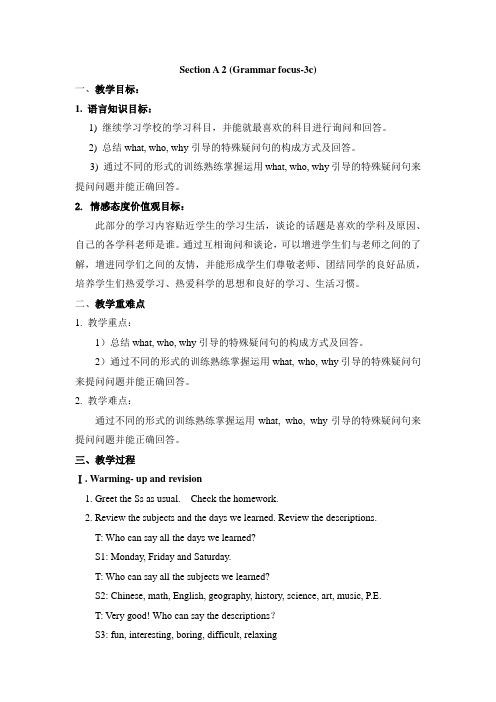
Section A 2 (Grammar focus-3c)一、教学目标:1. 语言知识目标:1) 继续学习学校的学习科目,并能就最喜欢的科目进行询问和回答。
2) 总结what, who, why引导的特殊疑问句的构成方式及回答。
3) 通过不同的形式的训练熟练掌握运用what, who, why引导的特殊疑问句来提问问题并能正确回答。
2. 情感态度价值观目标:此部分的学习内容贴近学生的学习生活,谈论的话题是喜欢的学科及原因、自己的各学科老师是谁。
通过互相询问和谈论,可以增进学生们与老师之间的了解,增进同学们之间的友情,并能形成学生们尊敬老师、团结同学的良好品质,培养学生们热爱学习、热爱科学的思想和良好的学习、生活习惯。
二、教学重难点1. 教学重点:1)总结what, who, why引导的特殊疑问句的构成方式及回答。
2)通过不同的形式的训练熟练掌握运用what, who, why引导的特殊疑问句来提问问题并能正确回答。
2. 教学难点:通过不同的形式的训练熟练掌握运用what, who, why引导的特殊疑问句来提问问题并能正确回答。
三、教学过程Ⅰ. Warming- up and revision1. Greet the Ss as usual. Check the homework.2. Review the subjects and the days we learned. Review the descriptions.T: Who can say all the days we learned?S1: Monday, Friday and Saturday.T: Who can say all the subjects we learned?S2: Chinese, math, English, geography, history, science, art, music, P.E.T: Very good! Who can say the descriptions?S3: fun, interesting, boring, difficult, relaxingT: Now tell your partner what you think of the subjects. You can say them like this:I think Chinese is interesting. I think math is…(Ss say something about all the subjects.)3. Ask and answer with your partner about the favorite subjects and the reasons.e.g.S1: What's your favorite subject, Xiao Ming?S2: My favorite subject is music.S1: Why do you like music?S2: Because it's relaxing.(Ss ask and answer with his or partner.)Ⅱ. Grammar Focus.1. 根据汉语提示完成下列句子。
(完整版)人教版初一上册英语第九单元unit9语法篇
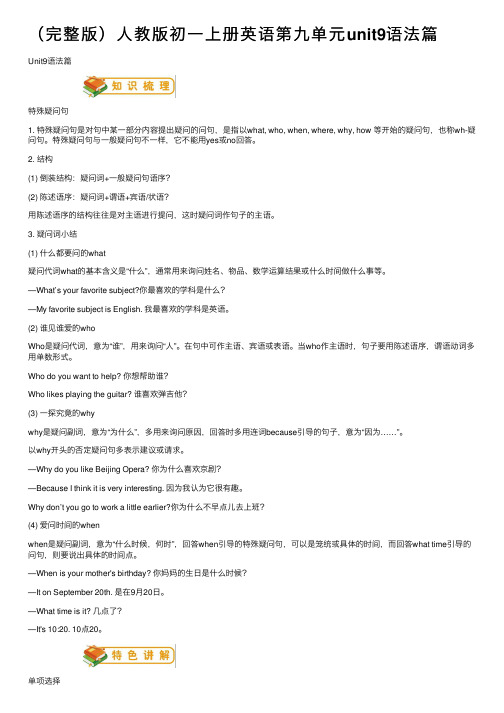
(完整版)⼈教版初⼀上册英语第九单元unit9语法篇Unit9语法篇特殊疑问句1. 特殊疑问句是对句中某⼀部分内容提出疑问的问句,是指以what, who, when, where, why, how 等开始的疑问句,也称wh-疑问句。
特殊疑问句与⼀般疑问句不⼀样,它不能⽤yes或no回答。
2. 结构(1) 倒装结构:疑问词+⼀般疑问句语序?(2) 陈述语序:疑问词+谓语+宾语/状语?⽤陈述语序的结构往往是对主语进⾏提问,这时疑问词作句⼦的主语。
3. 疑问词⼩结(1) 什么都要问的what疑问代词what的基本含义是“什么”,通常⽤来询问姓名、物品、数学运算结果或什么时间做什么事等。
—What’s your favorite subject?你最喜欢的学科是什么?—My favorite subject is English. 我最喜欢的学科是英语。
(2) 谁见谁爱的whoWho是疑问代词,意为“谁”,⽤来询问“⼈”。
在句中可作主语、宾语或表语。
当who作主语时,句⼦要⽤陈述语序,谓语动词多⽤单数形式。
Who do you want to help? 你想帮助谁?Who likes playing the guitar? 谁喜欢弹吉他?(3) ⼀探究竟的whywhy是疑问副词,意为“为什么”,多⽤来询问原因,回答时多⽤连词because引导的句⼦,意为“因为……”。
以why开头的否定疑问句多表⽰建议或请求。
—Why do you like Beijing Opera? 你为什么喜欢京剧?—Because I think it is very interesting. 因为我认为它很有趣。
Why don’t you go to work a little earlier?你为什么不早点⼉去上班?(4) 爱问时间的whenwhen是疑问副词,意为“什么时候,何时”,回答when引导的特殊疑问句,可以是笼统或具体的时间,⽽回答what time引导的问句,则要说出具体的时间点。
精品七年级英语上全册unit9教案.docx

精品七年级英语上全册unit 9教案单元整体说明单元教材分析本单元主要学习使用 want 来谈论和表达自己的喜好;学习运用表示品质的形容词来表达自己喜好的理由;学习连词 and 和 but 的用法;巩固行为动词一般现在时的结构和名词单、复数的构成。
本单元通过“介绍电影,谈论喜好”和“制定计划”这两个话题,设计了三个任务型活动:任务一是:根据自己的喜好,搜集奥斯卡电影资料,进行介绍;任务二是:我不确定,学习“表达计划安排”的有关知识;任务三是:学写小作文,让学生掌握“陈述理由”的方法和正确使用表示品质的形容词。
单元知识系统( 树 )Do you want to go to a movie? Yes, I do. No, I don’ t.Does he /she want to go to a movie? Yes, he /she does. No, he /she doesn’ t.What kind of movies do you want?I like action movies and documentaries.单元总体目标通过本单元的学习让学生掌握所学目标语言;学会询问他人的喜好和谈论自己的喜好,并能够表达自己喜好某一类电影的理由;能根据自己的爱好制订出周末或节假日的行动计划。
单元重难点一览重点难点1.复习词汇: want, like , and, but, interesting,boring语法重点:行为动词2.词汇: go,movie ,action, y ,documentary, thriller ,Beijing一般现在时的结构;Opera, scary,funny ,sad, exciting , kind名词单、复数的构成3.句型: Do you want to go to a movie? Yes, I do./ No , I don ’t.和使用。
Does he/ she want to go to a movie?Yes.he/she does./ No .he/ she doesn .’tWhat kind of movies do you want?I like action movies and documentaries .每单元学情分析本单元的主题是谈论喜好和制订计划,围绕这两个主题进行一系列的交际活动,使学生正确使用want 来谈论和表达自己的喜好并学会制订计划;同时复习了行为动词一般现在时的结构和名词单、复数的构成。
人教版英语七年级上册Unit9整体教学设计

7.结合学生的实际水平,实施分层教学,关注每个学生的学习进度。对基础较弱的学生,给予个别辅导,提高他们的学习效果。
8.定期进行教学评价,了解学生的学习情况,及时调整教学策略,以提高教学效果。
5.培养学生的爱国情怀,学会用英语向外国朋友介绍中国的文化、历史和传统。
二、学情分析
针对人教版英语七年级上册Unit9的教学内容,学情分析如下:
1.学生年龄特点:七年级学生正处于青春期,好奇心强,求知欲旺盛,对于新鲜事物充满兴趣。在本章节的学习中,可以通过引入跨文化交际的元素,激发学生的学习热情。
2.英语水平:经过前几个单元的学习,学生已具备一定的英语基础,但在词汇和语法方面仍有待提高。因此,在教学过程中,要注意巩固和拓展所学知识,逐步提高学生的语言运用能力。
(三)学生小组讨论
1.教师将学生分成若干小组,每组选择一个国家,要求学生用英语讨论该国家的文化特点、风土人情等。
2.各小组向全班展示讨论成果,其他小组的学生可针对展示内容进行提问,以此提高学生的口语表达能力和跨文化交际意识。
3.教师引导学生运用所学词汇和语法,就“Do you want to have a pen pal from another country? Why?”这一话题展开小组讨论,培养学生的思辨能力和合作精神。
3.写作能力:学会用英语书写书信,表达自己的观点和情感,对学生来说具有一定的挑战性。
(二)教学设想
1.采用情景教学法,引入真实语境,让学生在实际交流中运用所学词汇和语法。例如,组织学生模拟与笔友写信、交流的活动,提高学生的语言实际运用能力。
2.利用多媒体教学资源,如图片、视频等,帮助学生形象地理解不同国家的文化特点,提高学生的阅读理解能力。
【精选】人教版七年级上册英语Unit9第九单元优秀教案
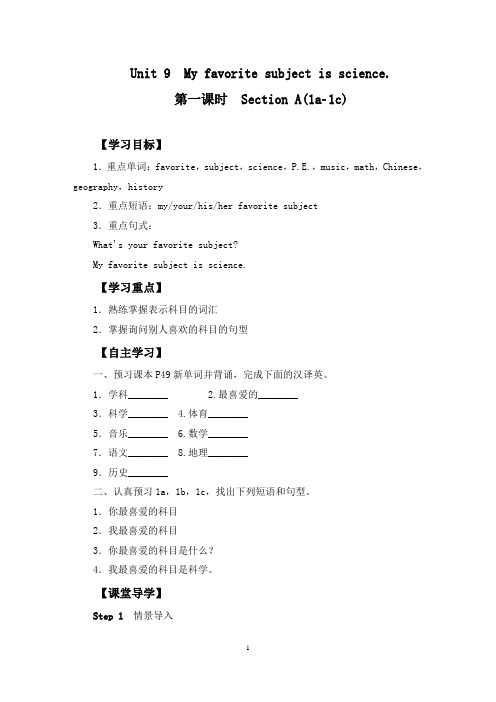
Unit 9 My favorite subject is science.第一课时Section A(1a1c)【学习目标】1.重点单词:favorite,subject,science,P.E.,music,math,Chinese,geography,history2.重点短语:my/your/his/her favorite subject3.重点句式:What's your favorite subject?My favorite subject is science.【学习重点】1.熟练掌握表示科目的词汇2.掌握询问别人喜欢的科目的句型【自主学习】一、预习课本P49新单词并背诵,完成下面的汉译英。
1.学科________ 2.最喜爱的________3.科学________ 4.体育________5.音乐________ 6.数学________7.语文________ 8.地理________9.历史________二、认真预习1a,1b,1c,找出下列短语和句型。
1.你最喜爱的科目2.我最喜爱的科目3.你最喜爱的科目是什么?4.我最喜爱的科目是科学。
【课堂导学】Step 1情景导入Teacher:Hello,everyone!We all know that we learn many subjects at school.Such as English,Chinese,math,music,art,history and so on.Of all the subjects,I like P.E. best.What is your favorite subject?Can you tell me your ideas about the subjects?环节说明:由教师自己的最喜爱的科目过渡到问学生最喜爱的科目,直接提出本节课要学的语言目标——询问对方最喜爱的科目。
人教版英语七年级上册 Unit 9 Grammar Focus 教案

Unit 9 My favorite subject is science.Grammar Focus教案Teaching aims:nguage points:1)Review how to ask and answer one’s favorite subject and the re ason.2)Learn wh- sentences.2.Emotion points:To know each other between Ss.Teaching focus and difficulties:1.---What’s your favorite… (subject, color, city…)?---My favorite…is…2.---Why do you like…?---Because it’s…3.---Who is your…teacher…?---Mr. /Miss…Teaching aids:tape recorder, slidesTeaching method:communicative approach, task-based language teaching method, cooperation. Teaching steps:Step1 Revision Warming up1.Ask and AnswerAsk some of the students what’s their favorite subject and why do they like the subject. The student being asked should use the sentence pattern: My favorite subject is..., because it is...Then the student being asked should ask other students what are their favorite subjects? And use the sentence pattern: what’s (his, her, Bob’s...) favorite subject? Why does Bob like...?When is your...class? Who’s your...teacher? And answer li ke: His/her favorite subject is...2.Purpose: 帮助学生回忆已经学过的学科表达,拓展运用特殊疑问句句型。
人教版新目标 初一英语七年级上册Unit 9 全单元教案
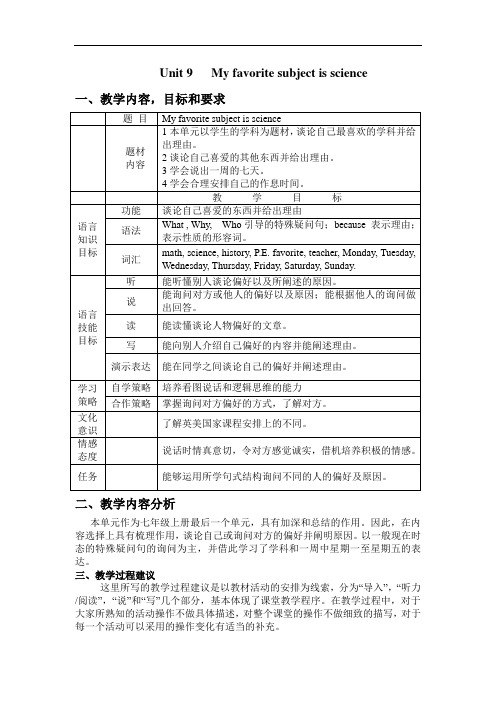
Unit 9 My favorite subject is science一、教学内容,目标和要求二、教学内容分析本单元作为七年级上册最后一个单元,具有加深和总结的作用。
因此,在内容选择上具有梳理作用,谈论自己或询问对方的偏好并阐明原因。
以一般现在时态的特殊疑问句的询问为主,并借此学习了学科和一周中星期一至星期五的表达。
三、教学过程建议这里所写的教学过程建议是以教材活动的安排为线索,分为“导入”,“听力/阅读”,“说”和“写”几个部分,基本体现了课堂教学程序。
在教学过程中,对于大家所熟知的活动操作不做具体描述,对整个课堂的操作不做细致的描写,对于每一个活动可以采用的操作变化有适当的补充。
Period One课型:Listening and speaking方法: Interactive approach教学目标: 1) To understand the dialogue involving preferences and reasons2) To talk about preferences and to give reasons教具: Tape recorder, picture, handout, OHP.教学步骤:Step 1 Warming-up/Leading-in (Activities 1a )目的:本阶段活动是为下面的听力做准备,起导入话题和复习词汇和学习新词汇的作用。
建议:作为对本课堂的导入,教师可以首先谈论一下自己的偏好,引出What’s your favorite subject ? 以及回答My favorite subject is ...句型,并且结合matching 活动复习有关学科词汇和学习新词汇subject , science ,P.E。
操作:方案1:直接进行1a活动,采用教师说左边单词,学生回答所找出的右图中的图画。
然后集体练习左边的学科词汇。
方案2:如果学生的水平比较高,教师可以增加活动的难度,例如在matching活动之前展示下列问题:1)Who are they in Picture ...?2)What are they doing?3)What’s his/her favorite subject?His/Her favorite subject is...Step 2 Listening and circling (1b)1) 指着1a 中的6幅图画,让不同的学生说出每幅图所表示的学科科目,然后让学生轮流训练说出图画中的学科科目名字。
人教版英语七年级上册 Unit9 Grammar Focus3c 教案
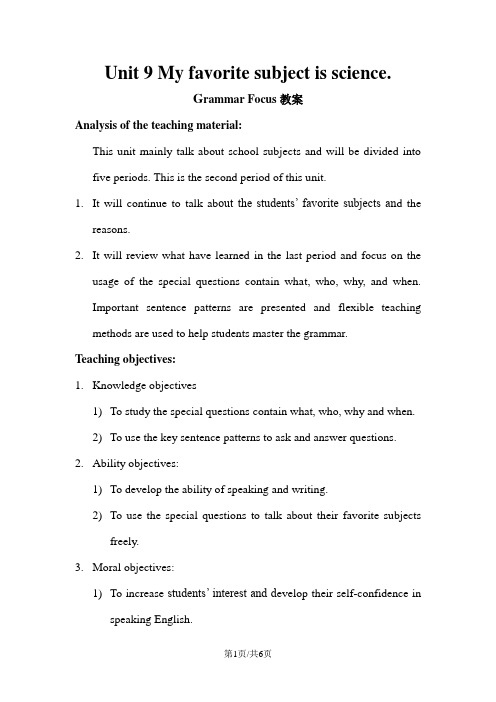
Unit 9 My favorite subject is science.G rammar Focus教案Analysis of the teaching material:This unit mainly talk about school subjects and will be divided into five periods. This is the second period of this unit.1.It will continue to talk ab out the students’ favorite subjects an d thereasons.2.It will review what have learned in the last period and focus on theusage of the special questions contain what, who, why, and when.Important sentence patterns are presented and flexible teaching methods are used to help students master the grammar.Teaching objectives:1.Knowledge objectives1)To study the special questions contain what, who, why and when.2)To use the key sentence patterns to ask and answer questions.2.Ability objectives:1)To develop the ability of speaking and writing.2)To use the special questions to talk about their favorite subjectsfreely.3.Moral objectives:1)To increase students’ interest and d evelop their self-confidence inspeaking English.2)To enhance the stude nts’ friendship between each other.Focus points and difficult points:1.To enable students to understand the usage of the special questions.2.To enable students to use the special questions to ask and answerquestions.Teaching aids:Multi-mediaTeaching procedures:Step 1 Revision and lead-in1.Review what have learned.2.Lead-in the new language point.1)Ask some of the students:What’s your fav orite subject?Why do you like the...?Who’s your...teacher?Wh at’s (his, her, Bob’s...) favorit e subject?Why does Bob like...?When is your...class?2)Ss: Answer questions use the sentence patterns:My favorite subject is...Because it is...My...teacher is ...Her/ his favorite subject is...It’s on Monday.Step 2 Grammar focusGuide students to understand how to use what, who, why, and when to ask questions, and how to answer the question including what, why, how, and when.1.Ask students to summarize the usage of what, who, why, andwhen. .2.Ask Ss to read the Grammar Focus box three times.3.Ask Ss to work in pairs, ask and answer with the sentences inGrammar Focus box.Step 3 Guessing game1.Show some pictures of the students in the class and ask other studentsto guess their favorite subjects.2.Ask students to use what, why, who, and when to ask and answerquestions.Step 4 Pair work1.Ask students to make dialogues with their partners use the sentencepatterns:1)What’s your favorite subject? My favorite subject is...2)Why do you like...? Because it is...3)Who is your...teacher? My...teacher is...4)When is your...class? It is on...2.Ss: Discuss and make dialogues with their partners3.Show their dialogues to the class.Step 5 Fill in the blanks1.Guide students to do the exercise in 3a and 3b2.Ss do the exercise carefully3.Check the answers.4.Exchange their answers with their partners to make sure the answersare correct.Step 6 Interview and report1.Guide the students to do the interview in 3c.2.The students are divided into several groups.3.Then give the survey to the students to discuss and show an examplefor them how to fill out the survey and do a report.1)Ask students to work in groups, and find out the one who has thesame favorite subject.2)Find out those who has the same favorite subject.Step 7 Summary1.Consolidate what have learned in the class today.2.Ss summarize the sentence patterns have learned. Listen carefully andanswer the teacher’s q uestions.Step 8 HomeworkWrite a short passage about my favorite subject.Blackboard design“师”之概念,大体是从先秦时期的“师长、师傅、先生”而来。
人教版七年级英语上册第9单元Unit9教案

人教版七年级英语上册第9单元Unit9教案教学目标- 研究并掌握有关谈论时间的表达方式:数字、星期几和月份。
- 研究并巩固表示频率的表达方式。
- 研究并运用一些固定表达方式来表达时间。
教学重点- 研究数字和日期的表达方式。
- 研究构建句子来询问和回答时间。
- 研究表达频率的词汇和短语。
教学内容第一课时1. 研究数字1-100,并掌握读写这些数字的方法。
2. 研究星期一至星期日的表达方式,并能够询问和回答哪一天。
3. 进行听力训练,练听懂和回答有关时间的问题。
4. 进行口语训练,练运用数字和星期几来表达时间。
第二课时1. 复上节课所学的数字和星期几的表达方式。
2. 研究和巩固几个常用月份的表达方式。
3. 研究通过构建句子来询问和回答日期。
4. 进行听力训练,练听懂和回答有关日期的问题。
5. 进行口语训练,练运用数字、星期几和月份来表达时间。
教学活动1. 数字题练。
2. 角色扮演,对话练。
3. 听力训练,配对练。
4. 小组合作,做问答练。
教学评估1. 听力评估:学生听懂并回答有关时间的问题。
2. 口语评估:学生能够运用所学知识自如地表达时间。
3. 书面评估:学生能够书写数字、星期几和日期。
教学延伸1. 给学生布置写作练题,要求他们用所学时间表达方式写一篇日记。
2. 鼓励学生参观博物馆、图书馆等有时间要求的场所,让他们运用所学知识进行实践。
3. 与学生讨论不同时区的时间差异,让他们了解不同国家和地区的时间习惯。
人教版-英语-七年级上册-9单元 单元知识点讲解教案
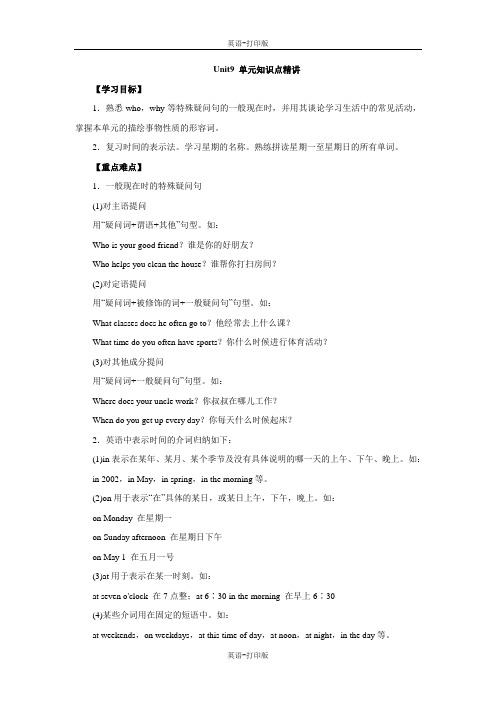
Unit9 单元知识点精讲【学习目标】1.熟悉who,why等特殊疑问句的一般现在时,并用其谈论学习生活中的常见活动,掌握本单元的描绘事物性质的形容词。
2.复习时间的表示法。
学习星期的名称。
熟练拼读星期一至星期日的所有单词。
【重点难点】1.一般现在时的特殊疑问句(1)对主语提问用“疑问词+谓语+其他”句型。
如:Who is your good friend?谁是你的好朋友?Who helps you clean the house?谁帮你打扫房间?(2)对定语提问用“疑问词+被修饰的词+一般疑问句”句型。
如:What classes does he often go to?他经常去上什么课?What time do you often have sports?你什么时候进行体育活动?(3)对其他成分提问用“疑问词+一般疑问句”句型。
如:Where does your uncle work?你叔叔在哪儿工作?When do you get up every day?你每天什么时候起床?2.英语中表示时间的介词归纳如下:(1)in表示在某年、某月、某个季节及没有具体说明的哪一天的上午、下午、晚上。
如:in 2002,in May,in spring,in the morning等。
(2)on用于表示“在”具体的某日,或某日上午,下午,晚上。
如:on Monday 在星期一on Sunday afternoon 在星期日下午on May 1 在五月一号(3)at用于表示在某一时刻。
如:at seven o'clock 在7点整;at 6∶30 in the morning 在早上6∶30(4)某些介词用在固定的短语中。
如:at weekends,on weekdays,at this time of day,at noon,at night,in the day等。
3.表示星期的名词共有七个表示星期的词:Monday,Tuesday,Wednesday,Thursday,Friday,Saturday,Sunday;提问方式:What day is it today?或What day is today?其中it指时间,today是副词,作状语。
人教版七年级英语上册教案:Unit 9 Grammar

池河中学2017-2018学年度第一学期教学设计年级七科目英语任课教师授课时间12.23 课题Unit 9 My favorite subject is science.Section A (Grammar -3d)授课类型语法课标依据本单元的主题是“谈论自己所喜欢的学科”,主要是学习学科的表达、表示品质的形容词、一周中星期一到星期天的表达方式。
本课围绕“谈论自己所喜欢的学科”这一话题,展开形式多样的听、说、读、写学习活动。
主要掌握各种学科的表达和用英语谈论自己喜欢的学科。
教学目标知识与技能1. Master the new words and useful expressions.2. Master key sentences.3. Describe different subjects.4. Express personal opinions to different subjects.过程与方法任务型教学法、情景交际法、自主学习与合作学习相结合情感态度与价值观stimulate students' potential of studying things.教学重点难点教学重点1. Master the new words and useful expressions.Words and phrases: Sunday, Monday, Tuesday,Wednesday, Thursday, Friday, Saturday, for sure2. Talk about subjects, schedules and teachers by usingthe following sentences.(1) —How's your day?—It's OK.(2) — I like Monday because I have P.E. and history.(3) —When do you have P.E.?— We have P.E. on Monday and Friday.编号:60教学Talk about subjects, schedules and teachers 难点教学师生活动设计意图过程设计Step 1: Warm-up1.Greet students as usual and check the homework.2.Review some words and phrases in the last period.3. Ask students to role-play the conversations in 2d.A: Hi, Bob. How's your day?B: It's OK. I like Monday because I have P.E and history. They're myfavorite subjects.A: Who's your P.E teacher?B: Mr. Hu. He always plays games with us.A: That's great. But why do you like history? It's boring.B: Oh, I think history is interesting. What's your favorite day?A: Friday.B: Why?A: Because the next day is Saturday.B: That's for sure. I like Friday, too.5. Invite some pairs to act their conversations out.Step 2: PresentationGrammar Focus1. Ask students to read the conversations focus on the interrogativewords and the answers.2. Ask students to work with their partners and practice the conversations.3. Invite some pairs to act out the conversations.Step 3: Practice1. Teach activity 3a(1) Ask students to read the sentences and make sure they know themeaning.(2) Ask students to fill in the blanks with what, who or why.(3) Invite some students to read their answers.(4) Check the correct answers with the class.2. Teach activity 3b(1) Ask students to read the column of answers and make sure theyknow the meaning of all sentences.(2) Ask students to try to write questions for the answers.(3) Invite some students to read their answers.(4) Check answers with the whole class.Step 4: ConsolidationTeach activity 3c1. Ask students to read the chart and make sure they know what todo.2. Ask students to interview three classmate and complete the chart.3. Invite some groups to read their results.4. Ask students to work with their partners and make their own conversations according to the chart.5. Give students an example.小对话谈论日期及星期,复习本单元语法的重点句型。
人教版七年级英语上册Unit 9教案
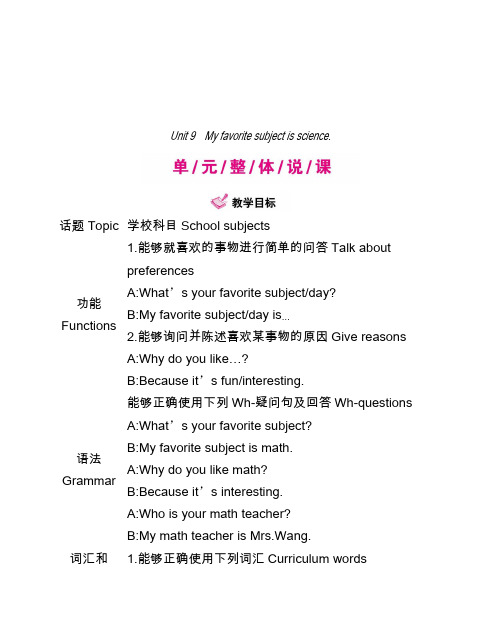
Unit 9 My favorite subject is science.话题Topic 学校科目School subjects功能Functions 1.能够就喜欢的事物进行简单的问答Talk aboutpreferencesA:What ’s your favorite subject/day? B:My favorite subject/day is …2.能够询问并陈述喜欢某事物的原因Give reasonsA:Why do you like …?B:Because it ’s fun/interesting.语法Grammar 能够正确使用下列Wh-疑问句及回答Wh-questionsA:What ’s your favorite subject?B:My favorite subject is math. A:Why do you like math?B:Because it ’s interesting.A:Who is your math teacher?B:My math teacher is Mrs.Wang.词汇和 1.能够正确使用下列词汇Curriculum words常用表达Words &expressions 名词:subject, science, P.E., music, math, Chinese, geography, history, Monday, Tuesday, Wednesday, Thursday, Friday, Saturday, Sunday, lesson, hour; 形容词:favorite, free, cool, useful;动词:finish;副词:why;介词:from;连词:because;其他:Mrs.2.能够正确使用下列常用表达Useful expressions favorite subject, from…to…, play games with…,How’s your day? That’s great! That’s for sure.How about you?3.能够认读下列词汇Non-curriculum wordsA.M.(=a.m.), P.M.(=p.m.)学习策略Strategies 1.进一步学习在听力和阅读过程中捕捉关键词:疑问词、学科名称等2.能够通过总结Wh-疑问句的用法, 初步培养复习、归纳知识的意识, 发展自主学习的能力文化知识Culture 1.了解中西方中学学制和学科设置的知识2.了解星期的小常识三维目标Three-dimensionaltarget 知识与技能1.能掌握以下单词:favorite, subject, science, P.E.,music, math, Chinese, geography, history, why,because, Monday, Friday, Saturday, free, cool,Tuesday, Wednesday, Thursday, Sunday,A.M.,P.M., useful, from, Mrs., finish, lesson, hour2.熟练掌握以下短语:for sure, from…to, havehistory,favorite subject, play games with…3.能掌握以下句型:A:What’s your/her/his/David’s favorite subject? B:My/Her/His/David’s favorite subject is science.三维目标Three-dimensionaltarget 知识与技能A:Why does Bob like history?B:Because it’s interesting.A:Why do they like P.E.?B:Because it’s fun.A:Who is your music teacher?B:My music teacher is Ms.Xie.4.掌握以下语法:学习和巩固Wh-疑问句;熟练谈论表示喜好以及表述理由的句型。
人教版初一上册英语第九单元unit9语法篇
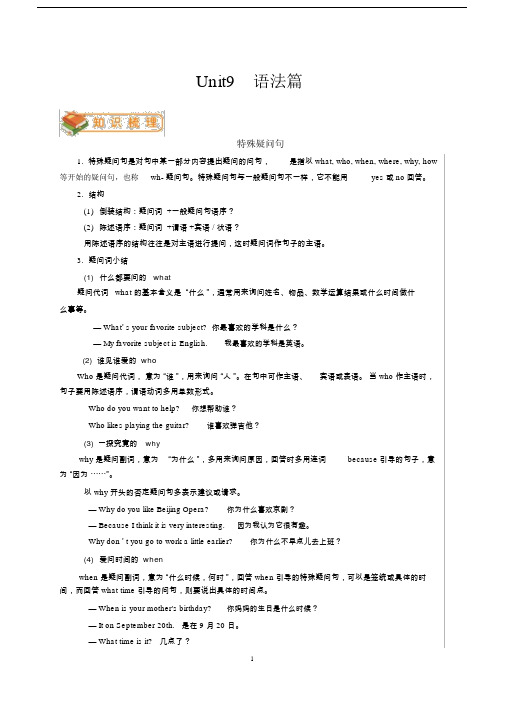
Unit9语法篇特殊疑问句1. 特殊疑问句是对句中某一部分内容提出疑问的问句,是指以what, who, when, where, why, how 等开始的疑问句,也称wh- 疑问句。
特殊疑问句与一般疑问句不一样,它不能用yes 或 no 回答。
2.结构(1)倒装结构:疑问词 +一般疑问句语序?(2)陈述语序:疑问词 +谓语 +宾语 / 状语?用陈述语序的结构往往是对主语进行提问,这时疑问词作句子的主语。
3.疑问词小结(1)什么都要问的 what疑问代词what 的基本含义是“什么”,通常用来询问姓名、物品、数学运算结果或什么时间做什么事等。
— What’ s your favorite subject? 你最喜欢的学科是什么?— My favorite subject is English.我最喜欢的学科是英语。
(2)谁见谁爱的 whoWho 是疑问代词,意为“谁”,用来询问“人”。
在句中可作主语、宾语或表语。
当who作主语时,句子要用陈述语序,谓语动词多用单数形式。
Who do you want to help?你想帮助谁?Who likes playing the guitar?谁喜欢弹吉他?(3) 一探究竟的whywhy 是疑问副词,意为“为什么”,多用来询问原因,回答时多用连词because引导的句子,意为“因为⋯⋯”。
以 why 开头的否定疑问句多表示建议或请求。
— Why do you like Beijing Opera?你为什么喜欢京剧?— Because I think it is very interesting.因为我认为它很有趣。
Why don ’ t you go to work a little earlier?你为什么不早点儿去上班?(4)爱问时间的 whenwhen 是疑问副词,意为“什么时候,何时”,回答 when 引导的特殊疑问句,可以是笼统或具体的时间,而回答 what time 引导的问句,则要说出具体的时间点。
人教七上 Unit9 My favorite subject is science.Section A 1a1c 说课稿
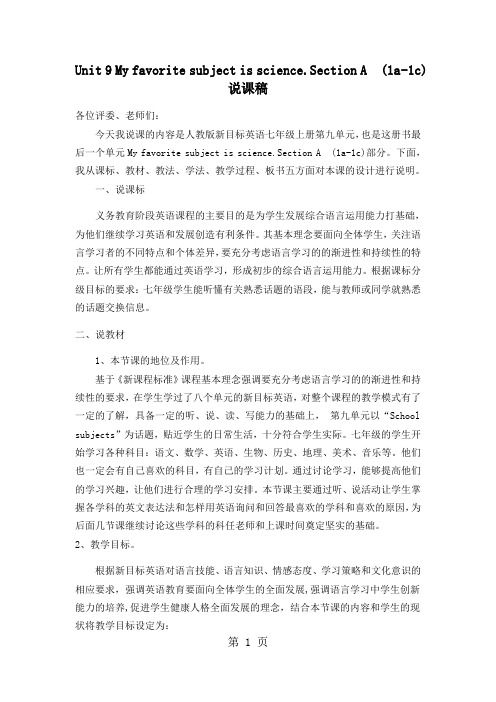
Unit 9 My favorite subject is science.Section A (1a-1c)说课稿各位评委、老师们:今天我说课的内容是人教版新目标英语七年级上册第九单元,也是这册书最后一个单元My favorite subject is science.Section A (1a-1c)部分。
下面,我从课标、教材、教法、学法、教学过程、板书五方面对本课的设计进行说明。
一、说课标义务教育阶段英语课程的主要目的是为学生发展综合语言运用能力打基础,为他们继续学习英语和发展创造有利条件。
其基本理念要面向全体学生,关注语言学习者的不同特点和个体差异,要充分考虑语言学习的的渐进性和持续性的特点。
让所有学生都能通过英语学习,形成初步的综合语言运用能力。
根据课标分级目标的要求:七年级学生能听懂有关熟悉话题的语段,能与教师或同学就熟悉的话题交换信息。
二、说教材1、本节课的地位及作用。
基于《新课程标准》课程基本理念强调要充分考虑语言学习的的渐进性和持续性的要求,在学生学过了八个单元的新目标英语,对整个课程的教学模式有了一定的了解,具备一定的听、说、读、写能力的基础上,第九单元以“School subjects”为话题,贴近学生的日常生活,十分符合学生实际。
七年级的学生开始学习各种科目:语文、数学、英语、生物、历史、地理、美术、音乐等。
他们也一定会有自己喜欢的科目,有自己的学习计划。
通过讨论学习,能够提高他们的学习兴趣,让他们进行合理的学习安排。
本节课主要通过听、说活动让学生掌握各学科的英文表达法和怎样用英语询问和回答最喜欢的学科和喜欢的原因,为后面几节课继续讨论这些学科的科任老师和上课时间奠定坚实的基础。
2、教学目标。
根据新目标英语对语言技能、语言知识、情感态度、学习策略和文化意识的相应要求,强调英语教育要面向全体学生的全面发展,强调语言学习中学生创新能力的培养,促进学生健康人格全面发展的理念,结合本节课的内容和学生的现状将教学目标设定为:(1)知识目标:掌握以下词汇,要求学生能熟练运用。
英语人教版七年级上册Unit9教案

Unit 9 My favorite subject is science.单元整体说明单元教材分析本单元主要学习一周中星期一到星期天的表达方式;掌握学科的表达;学习用because 和表示品质的形容词表示理由;学习what,why,who引导的特殊疑问句。
本单元围绕“谈论自己所喜欢的学科”这一话题,设计了三个任务型活动:任务一是:谈论自己所喜欢的学科,学习what引导的特殊疑问句和学科的表达;任务二是:一分钟演讲,让学生介绍自己喜欢某一学科的理由,学习why等特殊疑问句;任务三是:写信,巩固和延伸所学知识,掌握星期的表达方式。
单元知识系统(树)What’s your/his/her favorite subject? My/His/Her favorite subject is English.Why do you like math.Because it’s interesting.Why does he/she like art? Because it’s fun.When do you have math? I have math 0n Monday,Wednesday and Friday.What’s Ken’s favorite subject? Science.单元总体目标通过本单元的学习使学生学会谈论自己喜好的学科或自己喜好的其它事情并给出理由;学会说出一周的七天;学会合理地安排自己的作息时间。
单元重难点一览单元学情分析本单元的主题是“谈论自己所喜欢的学科”,主要是学习学科的表达、表示品质的形容词、一周中星期一到星期天的表达方式;学习用because表示理由。
在询问“对方所喜欢的学科和人物”、“星期几”时,要使用以前所学过的What、Who疑问句,再学习“询问理由”所用的Why疑问句。
教师可引导学生通过比较、对照的方法掌握所学疑问句的结构和使用以及回答。
单元教学建议采用Imitating and repeating,Practicing,Comparing和Role playing的学习策略,利用教学图片、幻灯片或制作多媒体课件来展开课堂Pairwork问答式的口语交际活动或调查活动,谈论各自所喜欢的学科或其它的事情并给出理由。
初一上英语unit9说课稿

初一上英语unit9说课稿Unit 9 说课稿尊敬的同事们,今天我将与大家分享初一上学期英语课程的第九单元的教学设计。
本单元的主题是“日常生活”,旨在通过学习与日常生活相关的词汇和表达,提高学生的英语听说读写能力,同时培养学生的跨文化交际意识。
教学目标:1. 知识与技能:学生能够掌握与日常生活相关的基本词汇和句型,如起床、吃饭、上学等。
2. 过程与方法:通过情景模拟、角色扮演等活动,让学生在实际语境中运用所学知识。
3. 情感态度与价值观:激发学生学习英语的兴趣,培养他们积极参与课堂活动的态度。
教学重点:- 日常生活相关词汇的掌握。
- 基本句型的运用,如“我通常……”、“我每天……”。
教学难点:- 学生能够灵活运用所学词汇和句型,进行日常对话。
- 培养学生的跨文化交际意识。
教学方法:- 情景教学法:通过设置与日常生活相关的情境,让学生在模拟的语境中学习语言。
- 任务型教学法:设计一系列的任务,让学生在完成任务的过程中学习并运用语言。
教学过程:1. 导入(Lead-in)- 通过展示一系列日常生活的图片,激发学生的兴趣,引入本单元的主题。
2. 呈现(Presentation)- 利用多媒体教学工具,展示日常生活相关的词汇和句型,如“get up”, “have breakfast”, “go to school”等。
3. 操练(Practice)- 分组让学生进行角色扮演,模拟日常生活中的对话场景,如家庭早餐、上学路上等。
4. 应用(Application)- 设计一个“我的一天”的写作任务,让学生描述自己的日常生活。
5. 产出(Production)- 组织学生进行小组讨论,分享自己的“我的一天”,并给予同伴反馈。
6. 总结(Summary)- 总结本单元的重点词汇和句型,强调其在日常生活中的应用。
7. 作业(Homework)- 布置相关的练习题和写作任务,巩固学生在课堂上学到的知识。
教学反思:在教学过程中,我将关注学生的反应和参与度,及时调整教学策略,确保每个学生都能积极参与并从中受益。
- 1、下载文档前请自行甄别文档内容的完整性,平台不提供额外的编辑、内容补充、找答案等附加服务。
- 2、"仅部分预览"的文档,不可在线预览部分如存在完整性等问题,可反馈申请退款(可完整预览的文档不适用该条件!)。
- 3、如文档侵犯您的权益,请联系客服反馈,我们会尽快为您处理(人工客服工作时间:9:00-18:30)。
人教版初一上册英语第九单元u n i t9语法篇Unit9语法篇特殊疑问句1. 特殊疑问句是对句中某一部分内容提出疑问的问句,是指以what, who, when, where, why, how等开始的疑问句,也称wh-疑问句。
特殊疑问句与一般疑问句不一样,它不能用yes或no回答。
2. 结构(1) 倒装结构:疑问词+一般疑问句语序?(2) 陈述语序:疑问词+谓语+宾语/状语?用陈述语序的结构往往是对主语进行提问,这时疑问词作句子的主语。
3. 疑问词小结(1) 什么都要问的what疑问代词what的基本含义是“什么”,通常用来询问姓名、物品、数学运算结果或什么时间做什么事等。
—What’s your favorite subject?你最喜欢的学科是什么?—My favorite subject is English. 我最喜欢的学科是英语。
(2) 谁见谁爱的whoWho是疑问代词,意为“谁”,用来询问“人”。
在句中可作主语、宾语或表语。
当who作主语时,句子要用陈述语序,谓语动词多用单数形式。
Who do you want to help? 你想帮助谁?Who likes playing the guitar? 谁喜欢弹吉他?(3) 一探究竟的whywhy是疑问副词,意为“为什么”,多用来询问原因,回答时多用连词because引导的句子,意为“因为……”。
以why开头的否定疑问句多表示建议或请求。
—Why do you like Beijing Opera? 你为什么喜欢京剧?—Because I think it is very interesting. 因为我认为它很有趣。
Why don’t you go to work a little earlier?你为什么不早点儿去上班?(4) 爱问时间的whenwhen是疑问副词,意为“什么时候,何时”,回答when引导的特殊疑问句,可以是笼统或具体的时间,而回答what time引导的问句,则要说出具体的时间点。
—When is your mother's birthday? 你妈妈的生日是什么时候?—It on September 20th. 是在9月20日。
—What time is it? 几点了?—It's 10:20. 10点20。
单项选择1. ---Why do you like science ?--- it’s difficult interesting .A. So; butB. Because ; andC. So; andD. Because ; but2. --- are you going to buy for your father for Father’s Da y ?---A T-shirt .A. WhatB. WhenC. WhereD. How3. --- does your cousin usually go to work on foot ?---He says it’s good for his health.A. WhereB. WhenC. WhyD. How4. ---What’s the of the red shoes ?---$56.A. colorB. priceC. number5. --- is your father ?---He’s forty .A. WhenB. How oldC. WhatD. How6. --- do you like Monday ?---We have music on Monday. You know , I like music very much .A. WhatB. WhyC. WhenD. How7. --- is your school trip ?---It is on December 19th.A. HowB. WhatC. WhenD. Where一、按要求转换句型(对划线部分提问)1. He likes art because it's fun.does he art?2. I have music on Friday.you have music?3. My English teacher is Mr. Liu.______ ______ your English teacher?4. My favorite color is blue.______ your favorite ______?答案:1. Why, like 2. When do 3. Who is 4. What's; color二、连词成句1. her, doesn't, why, Li Mei, like teacher, math?______________________________________________________2. teacher, music, she, does, like, Mr. Green, her?______________________________________________________3. Sunday, my, day, favorite, of, the week, is__________________________________________.4. your, favorite, subject, what's__________________________________________?5. you, do, like, math________________________________?三、补全对话(填空)根据对话情景,填入适当的句子完成对话。
A: Hi, Paul. May I ask you some questions?B: 1.A: Do you like your school?B: Yes, I like it very much.A: 2.B: My favorite subject is science.A: 3.B: Because it's interesting and useful.A: 4.B: Mr. Hu is our science teacher. He is fun.A: 5.B: Oh, our science class is on Monday and Friday.A: Then you like Monday and Friday, yes?B: You are right. They are my favorite days.一、单项选择1. --- is her favorite subject?---Her favorite subject is art.A. WhyB. WhenC. WhoD. What2. --- is your head teacher?--- Mr. Smith.A. WhenB. WhatC. WhyD. Who3. --- Why do you like English?--- it's very interesting.A. SoB. BecauseC. AndD. But4. --- Who likes music in your class?--- Sally .A. doB. doesC. isD. are5. --- ?--- It's Tuesday.A. What's the timeB. What's the dateC. What day is it todayD. Is it Monday6. --- Why he like pandas?--- Because it's from China.A. isB. areC. doD. does7. --- your father?--- He's a teacher.A. WhatB. HowC. WhoD. What's8. How old your cousin brothers?A. areB. amC. isD. were9. When does your school ?A. overB. finishesC. endD. begins10. --- ?--- At a hotel.A. When does Scott workB. When Scott worksC. Where does Scott workD. Where does Scott works二、完形填空Amy is 12 years old. She is a middle school 1 now. Today is her first day to go to school. She gets to school 2 7:30. She sees many boys and girls in the school. Amy 3her classroom quickly(很快地). It's on 4 floor(层).The class begins at 8:00. 5 old woman comes into the classroom. She 6 very nice. "Good morning, I'm Mrs. Green. I'm your 7 teacher. Our English classes are on Monday and Wednesday. I think you'll 8 my classes," says Mrs. Green. After the English class, Amy has science, math and music. Math is her 9 subject. In the afternoon, Amy has art and P.E. This is Amy's first day at school. Do you remember(记得) 10 ?1. A. student B. teacher C. classmate D. friend2. A. in B. on C. at D. for3. A. calls B. gets C. finds D. buys4. A. two B. the two C. second D. the second5. A. A B. An C. The D. /6. A. sees B. looks C. meets D. watches7. A. Chinese B. math C. art D. English8. A. lose B. finish C. like D. do9. A. first B. next C. favorite D. dear10. A. mine B. yours C. his D. hers阅读理解AHello! My name is Emma. My favorite day is Friday. Do you know why? We have four classes in the morning. We have a music lesson on Friday morning. It is my favorite subject. I also like other three lessons in the morning. They are English, Chinese and math. In the afternoon we usually have three classes, but on Friday afternoon we only have two classes P.E. and oral(口语) English. P.E. teacher is my favorite teacher because her lessons are veryinteresting.1. Emma’s favorite day is.A. SundayB. SaturdayC. FridayD. Thursday2. Emma’s favorite subject is.A. EnglishB. musicC. ChineseD. math3. Emma usually has lessons a day.A. twoB. threeC. sixD. seven4. Emma’s favorite teacher is teacher.A. musicB. P.E.C. oral EnglishD. Chinese5. How many classes do they have on Friday afternoon?A. Only two classes.B. Three classes.C. Five classes.D. Six classes.BSchool Open Day (学校开放日)Dear students,We have some interesting and fun things for you this term. On September 9th 2014, we have a School Open Day. It begins at 9:00 a.m. and finishes at 4:00 p.m. All parents can come to our school, have a cup of coffee, and meet our teachers and other parents.Your parents can go to your children’s classrooms, have a talk with the principal (校长),have a look at the clubs and ask any questions. From 11:30 a.m. to 12:30 am, the parents can go to Room 106 for lunch. If you have any questions about the School Open Day, you can call John Smith---the principal. The telephone number is 021-*******.Welcome to our school and join us.School: Apple Tree Middle School6. When is the School Open Day?A. In 2014 .B. On September9th, 2014.C. In September.D. From 9:00 a.m. to 3:00 p.m.7. The parents can be in the school for ______ hours.A. oneB. threeC. sevenD. eight8. Where do parents have lunch?A. In a park.B. In their children’sclassrooms.C. In Room 106 .D. At home.9. If (如果) you want to get more information (更多信息), you can call ______at 021-*******.A. the principalB. the teachersC. the childrenD. other parents10. Which is wrong?A. Parents can ask any questions on School Open Day.B. The name of the school is Apple Tree Middle School.C. The principal of the school is John Smith.D. Parents ca n’t st ay (停留) at Apple Tree Middle School at 3:30 on the School Open Day.CThe students were having their chemistry class. Miss Li was telling the children what water was like. After that, she asked her students, "What's water?" No one spoke for a few minutes. Miss Li asked again, "Why don't you answer my question? Didn't I tell you what water is like?"Just then a boy put up his hand and said, "Miss Li, you told us that water has no color and no smell. But where to find such kind of water? The water in the river behind my house is always black and it has a bad smell." Most of the children agreed with him."I'm sorry, children," said the teacher, "Our water is getting dirtier and dirtier. That's a problem."11. The students were having their class.A. EnglishB. ChineseC. chemistryD. maths12. Miss Li was telling the children what was like.A. waterB. airC. earthD. weather13. A boy said, "The water in the river behind my house is always ."A. whiteB. blackC. cleanD. clear14. Most of the children the boy.A. agreed withB. wrote toC. laughed atD. were angry with15. The water in the river has color and smell because it is getting .A. more and moreB. less and lessC. cleaner and cleanerD. dirtier and dirtierDOUR SCHOOLWe are students of No. 2 Middle School. In our school, there are many teachers and students. There are some rows of houses and there are trees and flowers, too.We are in Class Four, Grade One. There are fifty students in our class, twenty-six girls and twenty-four boys. Our classroom is big. There are six windows and two doors. The walls are white. On the front(前面的) wall there is a blackboard. There are some pictures and two maps on the others. Our desks and chairs are new. Our classroom is very nice.We study(学习) English, Chinese, math and other subjects(科目). Our teachers are good to us. We all like them.16. The story is about .A. a classB. a factoryC. a school17. How many teachers are there in our school?A. Sorry, I don't know.B. Twenty-six.C. Fifty.18. In our school we have .A. housesB. trees and flowersC. A and B19. In our classroom we have .A. a blackboardB. a pictureC. a map20. We like our teachers because .A. they are our teachersB. they are good to usC. they are oldEIn the old days in Europe, people believed that trees were embodiment(化身) of powerful beings. In the sixteen century, German families began to bring green trees into their homes during the Christmas seasons. By the seventeenth century(世纪), they cut the tops of evergreens and hung upside down in a living-room corner. And then they decorated them with fruits, candies, cookies and candles.The first Christmas trees in America were set up by German immigrants(移民) in the 1820s. Now at Christmas time decorated trees stand in about two-thirds of American homes. The modern American tree is usually covered with colored balls and strings of colored lights.21. The passage is mainly about .A. how people in the past enjoyed ChristmasB. when people began to enjoy ChristmasC. Christmas treesD. Christmas history22. When and where were Christmas trees first used in the world?A. In the sixteenth century in Germany.B. In the seventeenth century in Germany.C. In the eighteenth century in America.D. In the nineteenth century in America.23. What does the underlined word "evergreens" mean?A. 圣诞树B. 落叶树C. 常青树D. 杨树24. People in the old days used Christmas trees during Christmas seasons because .A. they liked to use it to decorate the houseB. they thought green trees were powerfulC. they wanted to put little presents on the treesD. they wanted to have a party around the trees25. Which of the following is true according to this passage?A. People now decorate the Christmas trees with the same things as they did in the old days.B. We may call a Christmas tree "evergreens" now.C. Christmas trees have power.D. Germans people brought the custom of using Christmas to America.。
